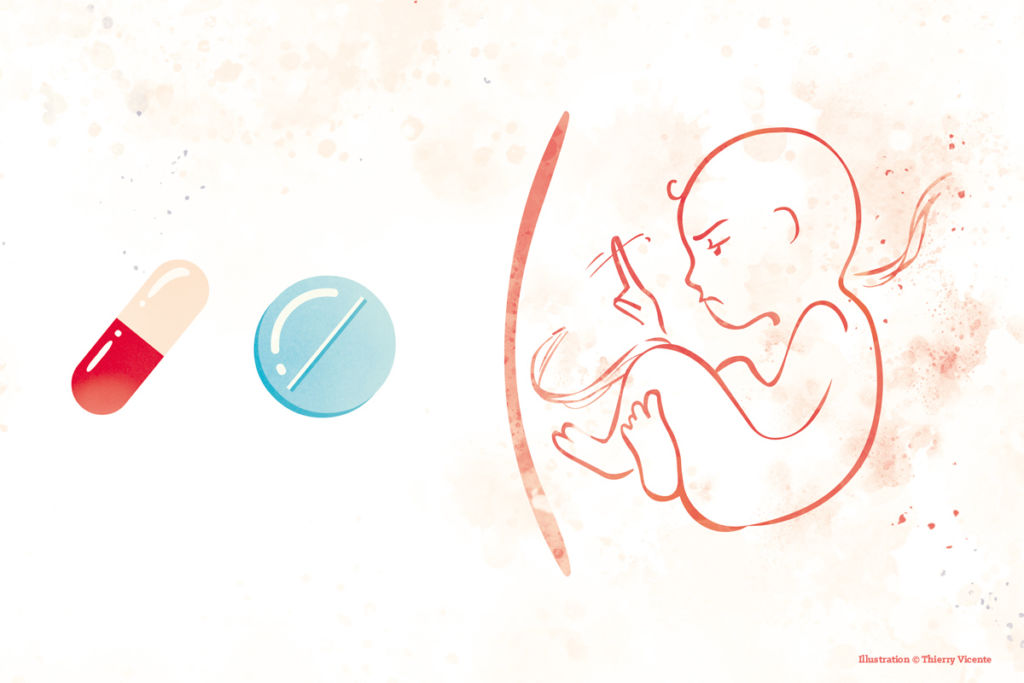[LUM#9] Painkillers and pregnancy: dangerous liaisons
A study by theInstitute of Human Genetics (IGH) reveals that taking paracetamol and non-steroidal anti-inflammatory drugs during pregnancy affects the fertility of unborn children. These alarming results suggest that the use of these drugs by pregnant women should be restricted.

To relieve pain, many pregnant women continue to take paracetamol combined with a non-steroidal anti-inflammatory drug such as ibuprofen during pregnancy. " An estimated 4% of women use this combination of molecules," explains Brigitte Boizet-Bonhoure. This over-the-counter cocktail is often considered harmless, but should not be used by pregnant women, as theIGH biologist's research has shown.
"Numerous studies have already shown that exposure to these molecules in early gestation increases the risk of genital malformations such as cryptorchidism or hypospad in newborn boys, but the consequences for the development of reproductive organs and the fertility of offspring were unknown," explains Brigitte Boizet-Bonhoure.
Early pregnancy: a critical period
To fill this knowledge gap, the researchers administered paracetamol and ibuprofen to mice in early gestation. " If we draw a parallel with the human species, this is the equivalent of a pregnant woman taking these two drugs at the doses usually authorized between the fourth and sixth weeks of pregnancy, bearing in mind that paracetamol is authorized throughout pregnancy and ibuprofen is only contraindicated from the sixth month onwards", explains Brigitte Boizet-Bonhoure.
However, the very beginning of gestation is a particularly sensitive phase: it's at this point in early embryogenesis that the reproductive system is put in place, with the formation of the ovaries and embryonic testes. "This embryonic period conditions the entire future sexual life, and any disruption of these processes can lead to fertility problems in the offspring.
And this is precisely what the researchers found. "When we analyze adult mice that had been exposed in utero, we show that the males produce fewer sperm." Even more worrying: when exposed animals interbreed, their offspring have less mobile sperm, leading to a decline in male fertility as early as 6 months of age, which corresponds to around 40 years in humans.
Review drug recommendations
Are there consequences for female mice too? " We are in the process of studying these data, but we have already observed that the fertility of females exposed in utero is also affected, with a particular risk of premature menopause," explains Brigitte Boizet-Bonhoure.
Can the results obtained in mice be extrapolated to humans? " Even if we can't transpose them 100%, there is currently enough data showing that these treatments have an impact on fertility to call for a review of drug recommendations," warns Brigitte Boizet-Bon-houre, who has expressed her concern to the French National Agency for the Safety of Medicines and Health Products.
These results are all the more worrying as they show that taking paracetamol and ibuprofen affects not only rodents exposed in utero, but also their offspring, who were not exposed to these drugs during gestation. " This suggests that exposure to these molecules induces intergenerational effects that could affect the genome and the regulation of germ cell genes in the same way as endocrine disruptors, with consequences spanning several generations", worries the biologist. In a context where human fertility continues to decline (see box), this is yet another factor to be taken into account to preserve reproductive health." Pregnant women need to be warned that taking paracetamol and ibuprofen, even at the very beginning of pregnancy, is not a harmless gesture."
Fertility in free fall
1 in 6. This is the proportion of couples who are unable to have a child without medical assistance. A worrying figure, "and one that's rising all the time", warns Professor Samir Hamamah, Head of the Reproductive Biology Department at Montpellier University Hospital. For the specialist, this decline in fertility is partly attributable to the chemicals with which we are confronted every day since birth... and even long before. "The fetus is already exposed to these products in the womb, which can alter the fertility of the child to come." Endocrine and environmental disruptors, pesticides, volatile organic compounds... in all, there are over a hundred molecules toxic to reproductive health that we handle every day, often without realizing it. " If you put on lipstick, you're coating yourself in glycol ether; when you heat a frozen dish in the microwave, you're ingesting phthalates" - these are just some of the dangerous substances that lurk even in the most innocuous everyday products.
UM podcasts are now available on your favorite platforms (Spotify, Deezer, Apple podcasts, Amazon Music...).